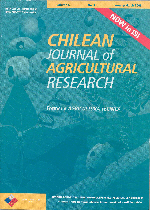
|
Agricultura Técnica
Instituto de Investigaciones Agropecuarias, INIA
ISSN: 0365-2807
EISSN: 0365-2807
Vol. 60, No. 1, 2002, pp. 52-61
|
 Bioline Code: at00005
Bioline Code: at00005
Full paper language: Spanish
Document type: Research Article
Document available free of charge
|
|
|
Agricultura Técnica, Vol. 60, No. 1, 2002, pp. 52-61
| en |
Productive and Economic Performance of Peasant Systems Under Surplus and Subsistence Conditions. A Case Study
de la Barra A., Rodrigo & Holmberg F., Germán
Abstract
This work studied the complex relations of peasant production
systems. The study was carried out in Maullín county, X Region of Chile,
between 1995 and 1997, where two types of peasant systems were analyzed: surplus
and subsistence. The results indicated that the subsistence system generates its
cash income with a greater diversity of items than the surplus system. In the
subsistence system, the production strategy is based on a high use of self-generated
inputs and minimized expenditures for labor and services. The surplus system bases
its production strategy on high labor and service expenses, and a high proportion
of production for sale; furthermore, what, how, and how much to produce are defined
completely in function of the exchange value. On the other hand, decisions in
the subsistence system are not totally guided by the market, because an important
part of production is related to the food requirements of the family. Also, a
high family labor use was observed, with contracting for labor only being made
when necessary, in contrast to the surplus system, where only 38% of the work
is performed by the family. With respect to capital, large differences between
the two systems were observed, which reinforces the view that the production strategy
is a reflection of the condition of endowment of given factors rather than the
consequence of the specific economic rationality of the peasant family.
Keywords
economía campesina, campesinado.
|
| |
| es |
Comportamiento Económico y Productivo de Sistemas Campesinos en Condición de Excedentariedad y Subsistencia. Estudio de Caso
de la Barra A., Rodrigo & Holmberg F., Germán
Resumen
Este trabajo estudia las relaciones de los sistemas de producción
campesinos. El estudio se realizó en la comuna de Maullín, Décima
Región de Chile, entre 1995 y 1997, donde se analizaron dos casos de sistemas
campesinos, uno excedentario y otro de subsistencia. Los resultados indican que
el tipo subsistencia genera sus ingresos en efectivo con una mayor diversidad
de rubros que el tipo excedentario. En el tipo subsistencia la estrategia productiva
se basa en el uso de autoinsumos y una baja contratación de mano de obra
y servicios, minimizando el desembolso en efectivo. El tipo excedentario basa
su estrategia productiva en un alto gasto en mano de obra y servicios, y una alta
proporción de la producción dirigida hacia la venta. Además, el
qué, cómo y cuánto producir es definido mayoritariamente en función
del valor de cambio. En cambio, en el tipo subsistencia las decisiones no son
totalmente orientadas por el mercado, ya que parte importante se relaciona con
los requerimientos alimentarios de la familia. Así, se observa un alto uso
del trabajo familiar, con contrataciones sólo cuando se supera la disponibilidad
de trabajo familiar; en contraposición al tipo excedentario, donde sólo
un 38% del trabajo es aportado por la familia. Respecto al capital, se observan
grandes diferencias entre los dos casos, lo que refuerza la idea de que la estrategia
productiva es un reflejo de una condición de dotación de factores dada,
más que la consecuencia de una racionalidad económica específica
de la familia campesina.
Palabras-clave
economía campesina, campesinado.
|
| |
© Copyright 2000 - Instituto de Investigaciones Agropecuarias, INIA (Chile)
Alternative site location: http://www.inia.cl/at/agritec.htm
|
|
